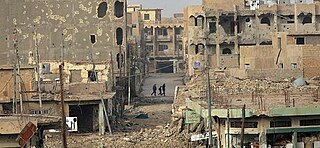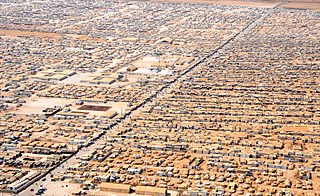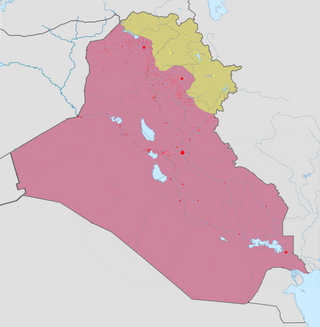Related Research Articles
Palestinian refugees are citizens of Mandatory Palestine, and their descendants, who fled or were expelled from their country over the course of the 1947–1949 Palestine war and the Six-Day War. Most Palestinian refugees live in or near 68 Palestinian refugee camps across Jordan, Lebanon, Syria, the West Bank and the Gaza Strip. In 2019 more than 5.6 million Palestinian refugees were registered with the United Nations.

The Lebanese Civil War was a multifaceted armed conflict that took place from 1975 to 1990. It resulted in an estimated 150,000 fatalities and also led to the exodus of almost one million people from Lebanon.

Following the American invasion of Iraq in 2003, a protracted insurgency began and lasted for the duration of the Iraq War. The initial outbreak of violence was triggered by the fall of Saddam Hussein and preceded the establishment of the new Iraqi government by the Multi-National Force – Iraq (MNF–I), which was led by the United States. From around 2004 to May 2007, Iraqi insurgents largely focused their attacks on MNF-I troops, but later shifted to targeting the post-invasion Iraqi security forces as well.

Black September, also known as the Jordanian Civil War, was an armed conflict between Jordan, led by King Hussein, and the Palestine Liberation Organization (PLO), led by chairman Yasser Arafat. The main phase of the fighting took place between 16 and 27 September 1970, though certain aspects of the conflict continued until 17 July 1971.

The Badr Organization, previously known as the Badr Brigades or Badr Corps, is an Iraqi Shia Islamist political party and paramilitary organization headed by Hadi Al-Amiri. The Badr Brigade was the Iran-officered military wing of the Iran-based Shia Islamic party, Supreme Council for Islamic Revolution in Iraq (SCIRI), formed in 1982. The Badr Brigade was created by Iranian intelligence and Shia cleric Mohammad Baqir al-Hakim with the aim of fighting Saddam Hussein's regime during the Iran–Iraq War. Since the 2003 US-led invasion of Iraq most of Badr's fighters have entered the new Iraqi army and police force. Politically, Badr Brigade and SCIRI were considered to be one party since 2003, but have now unofficially separated with the Badr Organization now an official Iraqi political party. Badr Brigade forces, and their Iranian commanders, have come to prominence in 2014 fighting the Islamic State of Iraq and the Levant (ISIL) in Iraq. It is a part of the Popular Mobilization Forces.

The Iraqi civil war was a civil war fought mainly between the Iraqi government along with American-led coalition forces and various sectarian armed groups, mainly Islamic State of Iraq and the Mahdi Army, from 2006 to 2008. In February 2006, the anti-American insurgency escalated into a sectarian civil war after the bombing of Al-Askari shrine, considered as a holy site in Twelver Shi'ism. US President George W. Bush and Iraqi officials accused Al-Qaeda in Iraq of orchestrating the bombing, although AQI publicly rejected any links to the attacks. The incident set off a wave of reprisals by Shia militants on Sunni civilians, followed by Sunni counterattacks on Shia civilians.

Iraqi Assyrians are an ethnic and linguistic minority group, indigenous to Upper Mesopotamia. Assyrians in Iraq are those Assyrians still residing in the country of Iraq, and those in the Assyrian diaspora who are of Iraqi-Assyrian heritage. They share a common history and ethnic identity, rooted in shared linguistic, cultural and religious traditions, with Assyrians in Iran, Assyrians in Turkey and Assyrians in Syria, as well as with the Assyrian diaspora. Assyrian diaspora in Detroit, Areas with large expat populations include Chicago and Sydney.

The 1991 Iraqi uprisings were ethnic and religious uprisings against Saddam Hussein in Iraq which were led by Shi'ites and Kurds. The uprisings lasted from March to April 1991 after a ceasefire following the end of the Gulf War. The mostly uncoordinated insurgency was fueled by the perception that Iraqi President Saddam Hussein had become vulnerable to regime change. This perception of weakness was largely the result of the outcome of the Iran–Iraq War and the Gulf War, both of which occurred within a single decade and devastated the population and economy of Iraq.

Refugees of Iraq are Iraqi nationals who have fled Iraq due to war or persecution. Throughout 1980 until 2017, there were a large number of refugees fleeing Iraq and settling throughout the world, peaking with the Iraq War and continued until the end of the most recent War in Iraq (2013–2017). Precipitated by a series of conflicts including the Kurdish rebellions during the Iran–Iraq War, Iraq's Invasion of Kuwait (1990) and the Gulf War (1991), the subsequent sanctions against Iraq (1991–2003), culminating in the Iraq War and the subsequent War in Iraq (2013–2017), millions were forced by insecurity to flee their homes in Iraq. Like the majority of refugees worldwide, Iraqi refugees established themselves in urban areas in other countries rather than in refugee camps. In April 2007, there was an estimate of over four million Iraqi refugees around the world, including 1.9 million in Iraq, 2 million in neighboring Middle East countries, and around 200,000 in countries outside the Middle East. The United Nations High Commissioner for Refugees (UNHCR) has led the humanitarian efforts for Iraqi refugees. The Iraqi displacement of several million was the largest in the Middle East at the time, and was even larger than the number of Palestinians who were displaced in 1948 during the creation of the state of Israel.

The Christians of Iraq are considered to be one of the oldest continuous Christian communities in the world.
Iraqis in Lebanon are people of Iraqi origin residing in Lebanon and Lebanese citizens of Iraqi ancestry. Statistics for Iraqi refugees in Lebanon vary, but typically put the number at around 50,000.

Palestinians in Iraq are people of Palestinians, most of whom have been residing in Iraq after they were displaced in 1948. Before 2003, there were approximately 34,000 Palestinians thought to be living in Iraq, mainly concentrated in Baghdad. However, since the 2003 Iraq War, the figure lies between 10,000–13,000, although a precise figure has been hard to determine. The situation of Palestinians in Iraq deteriorated after the fall of Saddam Hussein and particularly following the bombing of the Al-Askari Mosque in 2006. Since then, with the rise in insecurity throughout Iraq, they have been the target of expulsion, persecution and violence by Shia militants, and the new Iraqi Government with militant groups targeting them for preferential treatment they received under the Ba'ath Party rule. Currently, several hundred Palestinians from Iraq are living in border camps, after being refused entry to neighbouring Jordan and Syria. Others have been resettled to third countries.
Since the late 1970s until the present, Iraq has witnessed numerous waves of refugees and emigrants due to significant events in its modern history. These events have led to the displacement of millions of Iraqis. These include over three decades of repression, periodic violent attacks, and massacres targeting the Kurdish population in the north and the Shi'a in the south, all carried out by Saddam Hussein's regime. Other factors include the Iran-Iraq War (1980-1988), the Gulf War of 1991, the prolonged economic sanctions until the overthrow of Saddam Hussein, and the 2003 US-led invasion of Iraq.
The Iraq War resulted in multiple humanitarian crises.

Syrian refugee camp and shelters are temporary settlements built to receive internally displaced people and refugees of the Syrian Civil War. Of the estimated 7 million persons displaced within Syria, only a small minority live in camps or collective shelters. Similarly, of the 8 million refugees, only about 10 percent live in refugee camps, with the vast majority living in both urban and rural areas of neighboring countries. Beside Syrians, they include Iraqis, Palestinians, Kurds, Yazidis, individuals from Somalia, and a minority of those who fled the Yemeni and Sudanese civil wars.

Palestinians in Syria are people of Palestinian origin, most of whom have been residing in Syria after they were displaced from their homeland during the 1948 Palestinian expulsion and flight. Palestinians hold most of the same rights as the Syrian population, but cannot become Syrian nationals except in rare cases. In 2011, there were 526,744 registered Palestinian refugees in Syria. Due to harsh conditions, the number of registered refugees has since dropped to about 450,000 due to many Palestinians fleeing to Lebanon, Jordan or elsewhere in the region to escaping to Europe as refugees, especially to Germany and Sweden.
A refugee crisis can refer to difficulties and dangerous situations in the reception of large groups of forcibly displaced persons. These could be either internally displaced, refugees, asylum seekers or any other huge groups of migrants.

The Iraqi conflict refers to a near-continuous series of events that began with the 2003 invasion of Iraq, which led to the fall of erstwhile Iraqi president Saddam Hussein. During the Iraq War, the Multi-National Force (MNF–I) of the United States helped to establish a Shia-dominated federal government under Iraqi politician Nouri al-Maliki. Around this time, the Iraqi insurgency had emerged with a predominant focus on fighting the occupying MNF–I troops and the new Iraqi government. However, the insurgency also involved inter-Iraqi sectarian violence, primarily between Shias and Sunnis. In 2011, the MNF–I withdrew from Iraq, leading to renewed sectarian violence from 2011 to 2013. During this period, the Islamic State (IS) emerged, triggering a a renewed war and an American-led intervention in 2014. In 2017, full-scale fighting in the country came to a close after the Islamic State was defeated by the Iraqi government and its allies, but a low-level IS insurgency remains ongoing in the rural northern parts of the country.
The Makhmur refugee camp was founded in 1998, and is located in the Makhmur District, some 60 Km southwest to Erbil, the capital of the Kurdistan Region of Iraq (KRG). About 12,000 Kurdish refugees, who fled the civil war between Kurds and the Turkish army in the 1990s, live in this refugee camp. The refugees and their descendants stem from the depopulated Kurdish villages in Turkey. The Turkish authorities claim they had to depopulate the villages as they have been infiltrated by militants of the Kurdistan Workers Party (PKK).
References
- ↑ "Palestinians in Iraq" (PDF). fmreview.org. Archived from the original (PDF) on 12 October 2008. Retrieved 14 August 2007.
- ↑ "Content". Archived from the original on 2015-09-24. Retrieved 2021-08-17.
- ↑ "Error - Amnesty International". Archived from the original on 2019-03-31. Retrieved 2021-08-17.
- ↑ Sassoon, Joseph. The Iraqi Refugees: The New Crisis in the Middle East, Paperback Edition. I.B. Tauris, 2011., p. 75
- ↑ "Palestinian Refugees from Iraq in Critical Need of Protection".
- ↑ "Nowhere to Flee". Human Rights Watch. 9 September 2006.
- ↑ "Factsheet: Palestinian Refugees in Iraq". Archived from the original on 2009-07-20.
- ↑ http://www.unhcr.no/Pdf/Position_countryinfo_2007/Iraq%20guidelines.pdf%5B%5D
- ↑ Refugees, United Nations High Commissioner for. "Refworld | UNHCR's Eligibility Guidelines for Assessing the International Protection Needs of Iraqi Asylum-seekers". Refworld.
- ↑ "Iraq" (PDF). UNHCR Global Appeal 2007.
- ↑ ""Protocol for the Treatment of Palestinians in Arab States, Casablanca Protocol", accessed on March 12th 2011".